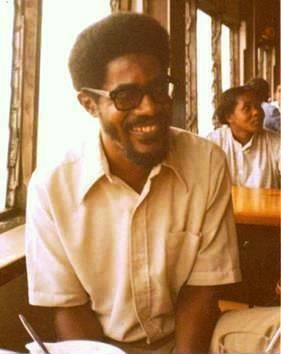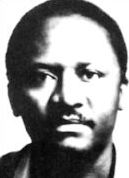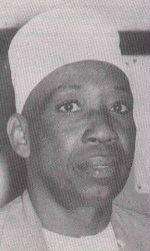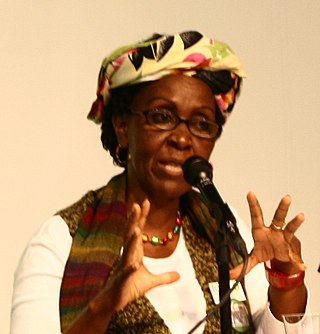
Dar es Salaam is the largest city and financial hub of Tanzania. It is also the capital of the Dar es Salaam Region. With a population of over five million people, Dar es Salaam is the largest city in East Africa and the sixth-largest in Africa. Located on the Swahili coast, Dar es Salaam is an important economic center and one of the fastest-growing cities in the world.

Walter Anthony Rodney was a Guyanese historian, political activist and academic. His notable works include How Europe Underdeveloped Africa, first published in 1972. He was killed in Georgetown, Guyana, in 1980.

Okot p'Bitek was a Ugandan poet, who achieved wide international recognition for Song of Lawino, a long poem dealing with the tribulations of a rural African wife whose husband has taken up urban life and wishes everything to be westernised. Song of Lawino was originally written in the Acholi dialect of Southern Luo, translated by the author into English, and published in 1966. It was a breakthrough work, creating an audience among anglophone Africans for direct, topical poetry in English; and incorporating traditional attitudes and thinking in an accessible yet faithful literary vehicle. It was followed by the Song of Ocol (1970), the husband's reply.

Shaaban bin Robert, also known as Shaaban Robert, was a Tanzanian poet, author, and essayist who supported the preservation of Tanzanian verse traditions. Robert is celebrated as one of the greatest Tanzanian Swahili thinkers, intellectuals and writers in East Africa and has been called "poet laureate of Swahili" and is also known as the "Father of Swahili." He is also honoured as the national poet.

Antjie Krog is a South African writer and academic, best known for her Afrikaans poetry, her reporting on the Truth and Reconciliation Commission, and her 1998 book Country of My Skull. In 2004, she joined the Arts faculty of the University of the Western Cape as Extraordinary Professor.

The University of Dar es Salaam (UDSM) is a public university located in Ubungo District, Dar es Salaam Region, Tanzania. It was established in 1961 as an affiliate college of the University of London. The university became an affiliate of the University of East Africa (UEA) in 1963, shortly after Tanzania gained its independence from the United Kingdom. In 1970, UEA split into three independent universities: Makerere University in Uganda, the University of Nairobi in Kenya, and the University of Dar es Salaam in Tanzania.

The Shadow of the Sun is a collection of journalistic accounts and essays by Polish writer and journalist Ryszard Kapuściński. It was published in 1998 and by Penguin Books in 2001 with the English translation by Klara Glowczewska.
Edward Moringe Sokoine was a Tanzanian politician who served two terms as Prime Minister of Tanzania, from 13 February 1977 to 7 November 1980 and again from 24 February 1983 to 12 April 1984.
Nkore is a Bantu language spoken by the Nkore ("Banyankore") of south-western Uganda in the former province of Ankole, as well as in Tanzania, the DR Congo, Rwanda and Burundi.
Runyakitara is a standardized language based on four closely related languages of western Uganda:
Aniceti Kitereza (1896–1981) was a Tanzanian Catholic cleric and novelist, born in 1896 on the island of Ukerewe, in Lake Victoria, in modern day Ukerewe District of Mwanza Region in Tanzania. In 1945, he wrote the first novel in his native language, Kikerewe. Only in 1981, it was published in Swahili under the title Myombekere na Bugonoka na Ntulanalwo na Bulihwali.
Mukotani Rugyendo is a Ugandan poet, writer and journalist probably best known for his poem "My Husband Has Gone".
The Vision Group of Companies, commonly known as the Vision Group, is a multimedia conglomerate in Uganda. It publishes the New Vision (newspaper), an English-language daily newspaper, that appears in print form and online, as well as newspapers and magazines in a variety of Ugandan languages.
Godfrey Mwene Kalimugogo was a novelist and diplomat from Uganda. He also served as a diplomat, representing Uganda in Tanzania and Ethiopia. He retired from the diplomatic service in 2003.

Grace Akello is a Ugandan poet, essayist, folklorist, and politician. She is the Uganda Ambassador to India.

Martha Mlagala Mvungi was a Tanzanian novelist, short-story writer, academic and teacher. She wrote in both Kiswahili and English.
Abdilatif Abdalla is a Kenyan writer and political activist. He was imprisoned for his support of the Kenya People's Union, and began writing poetry in solitary confinement. A collection of poems from this time were published as a book titled Sauti ya Dhiki (1973), which was awarded the Jomo Kenyatta Prize for Literature.
Austin Bukenya is a Ugandan poet, playwright, novelist and academic administrator. He is the author of the novel The People's Bachelor, and a play, The Bride. He has taught languages, literature and drama at Makerere University in Uganda and universities in the UK, Tanzania and Kenya since the late 1960s. He has also held residences at universities in Rwanda and Germany. Bukenya is also a literary critic, novelist, poet and dramatist. An accomplished stage and screen actor, he was for several years Director of the Creative and Performing Arts Centre at Kenyatta University, Nairobi.

Elieshi Lema is a Tanzanian writer and publisher, also active in Tanzania's civil society.
Farouk Mohamedhusein Tharia Topan is the director of the Swahili Centre at the Aga Khan University. He is a specialist in the language and literature of the Swahili people. He has taught at the University of Dar es Salaam, the Institute of Ismaili Studies, and the School of Oriental and African Studies.









